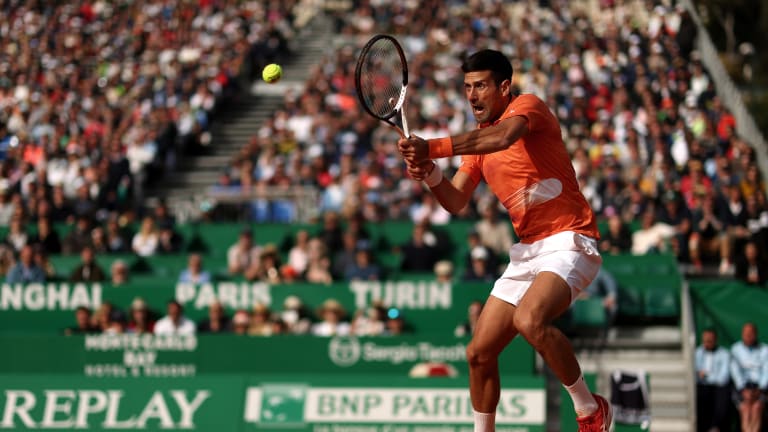ATP Monte Carlo, Monaco
Novak Djokovic's comments, Marcelo Rios' criticism: not all is well in the world No. 1's world
By Apr 15, 2022ATP Monte Carlo, Monaco
Monte Carlo takeaways: Alcaraz wins by playing for himself, one-handed backhands hold firm
By Apr 14, 2025ATP Monte Carlo, Monaco
Carlos Alcaraz overcomes worn-out Lorenzo Musetti for first title in Monte Carlo
By Apr 13, 2025ATP Monte Carlo, Monaco
Carlos Alcaraz vs. Lorenzo Musetti: Where to watch, and who will win, their Monte Carlo final
By Apr 12, 2025ATP Monte Carlo, Monaco
Carlos Alcaraz charges past Alejandro Davidovich Fokina to reach Monte Carlo final
By Apr 12, 2025ATP Monte Carlo, Monaco
Alex de Minaur: 6-0, 6-0 win over Grigor Dimitrov in Monte Carlo was 'bizarre'
By Apr 11, 2025ATP Monte Carlo, Monaco
Carlos Alcaraz vs. Alejandro Davidovich Fokina: Where to Watch, Monte Carlo Preview, Betting Odds
By Apr 11, 2025ATP Monte Carlo, Monaco
Alex de Minaur vs. Lorenzo Musetti: Where to Watch, Monte Carlo Preview, Betting Odds
By Apr 11, 2025ATP Monte Carlo, Monaco
Carlos Alcaraz waits for his chances to clinch first clash with Arthur Fils in Monte Carlo
By Apr 11, 2025ATP Monte Carlo, Monaco
Stefanos Tsitsipas vs. Lorenzo Musetti: Where to Watch, Monte Carlo Preview, Betting Odds
By Apr 10, 2025Novak Djokovic's comments, Marcelo Rios' criticism: not all is well in the world No. 1's world
The former No. 1 called the Serb "the king of stupidity," while the 20-time Grand Slam champion admitted "the past three to four months have been really difficult."
Published Apr 15, 2022
Advertising
Advertising

Novak Djokovic said he "ran out of gas" against Alejandro Davidovich Fokina.
© Getty Images